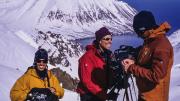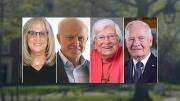The Radcliffe Institute for Advanced Study celebrates its tenth anniversary this month. Dean Barbara J. Grosz launched the official recognition today--the anniversary of the signing of the agreement that launched Radcliffe College's transformation--by delivering the Morning Prayers address in Memorial Church's Appleton Chapel. (See here for Harvard Magazine's 1999 coverage of the agreement.) The text of her remarks follows here; more details on the institute and its anniversary symposium October 8-9 are available at its website.
Dean Grosz's remarks, titled, "Identity, Transitions, Transformations," as prepared for delivery:
Genesis 32:24-28
Jacob was left alone; and a man wrestled with him until daybreak. When the man saw that he did not prevail against Jacob, he struck him on the hip socket; and Jacob’s hip was put out of joint as he wrestled with him. Then he said, “Let me go, for the day is breaking.” But Jacob said, “I will not let you go, unless you bless me.” So he said to him, “What is your name?” And he said, “Ya’akov.” Then the man said, “You shall no longer be called Ya’akov [heel-sneak], but Yisrael [God-fighter], for you have striven with God and with humans, and have prevailed.”
Jacob has just moved his family and possessions across the Yabbok River ("ma-aver Yabbok" in Hebrew). He is crossing into a different kind of life and a new leadership role. His name change symbolizes a change in identity. (“ma-aver Yaakov”?) "Left alone" Jacob is afraid. Transitions, even good ones, may be intimidating.
Universities are places of transition. By venturing into courses in fields they haven’t previously explored, students may find new and different options for careers as well as concentrations. As faculty participate in the learning, teaching, intellectual community that is Harvard, they too may branch out, becoming interdisciplinary in their work or even changing fields.
Transitions are daunting and life transforming. Embracing change, taking on the new and unknown however intimidating the risk, affords a different kind of growth and learning.
Like individuals, a university’s constituent schools may reach points which call for a change of identity. In the late 1990s, the Radcliffe College Board of Trustees, recognizing how Radcliffe, Harvard, and the world had evolved, began to examine Radcliffe's future and its new potentials for leadership.
A bit of history: The "Harvard Annex" was created in 1879, with the goal of making a Harvard education available to women. The Annex was chartered in 1894, by the Commonwealth of Massachusetts, as Radcliffe College. Not until World War II did Harvard allow women students into Harvard classrooms (1943), and only in 1963, were women admitted to the Graduate School.
While Harvard was coming to accept women as students, something else was afoot at Radcliffe College. In 1960, concerned about what she called the "climate of unexpectation" facing women academics, President Mary Ingraham Bunting established an “Institute for Independent Study”. This experimental program was aimed at “reviving and renewing the neglected talents and training of highly educated women” thus enabling such women to resume productive scholarly and artistic careers. The Bunting Fellowship Program, as it was later named, with its community of scholars, scientists, and artists, became key to the decision of what Radcliffe would become.
And so, ten years ago today, on October 1, 1999, the Radcliffe College Board of Trustees and the Harvard Corporation created the Radcliffe Institute for Advanced Study, thus beginning a new phase of Radcliffe's history. As it changed identity, roles, and institutional relationships, Radcliffe had the potential to lead as an institute for advanced study of a different shape and scope. The transition that this agreement embodied was a bold, indeed risky, one for both parties.
Institutes for advanced study fill an increasingly important niche in academia. They encourage intellectual risk taking, by giving scholars, scientists and artists protected time in which they can explore and experiment in new ways, and by providing rich cross-disciplinary communities that encourage the expansion of approaches. Like other institutes for advanced study, Radcliffe supports a fellowship program—now one of the leading programs in the world. Radcliffe brings to the company of such institutes its traditional insistence on including women in institutions of academic excellence and a continuing commitment to the study of women, gender, and society. It is, consequently, helping crack glass ceilings and narrow recognition gaps at the highest levels of academia.
The Radcliffe Institute is unique among such institutes in being a full-fledged school within a university. This standing has led Radcliffe to design a spectrum of Academic Engagement Programs, which engage Harvard faculty and students from different disciplines and across Harvard’s schools in new scholarly and research endeavors. And, Radcliffe’s Schlesinger Library, well known as the premier repository of collections on women in America, has been advancing another facet of Harvard’s pre-eminence by leading in “born digital” collections.
The Radcliffe Institute is thus demonstrating that an institute for advanced study can simultaneously provide a refuge for scholars and be an active participant in advancing a university's intellectual agenda. Throughout this academic year, we will be celebrating the first ten years of Radcliffe’s being an institute for advanced study. The celebrations begin with a symposium next week, on Thursday and Friday, to which you are all invited.
The anniversary symposia panels cross disciplines and will challenge received ideas. I hope they, like Radcliffe’s other endeavors, will inspire students, faculty, fellows, staff and institution leaders alike, so that, like Jacob, we have the courage to risk unknown roads and the strength to overcome the obstacles we encounter along the way. And, may our circumstances enable us to realize our dreams.





